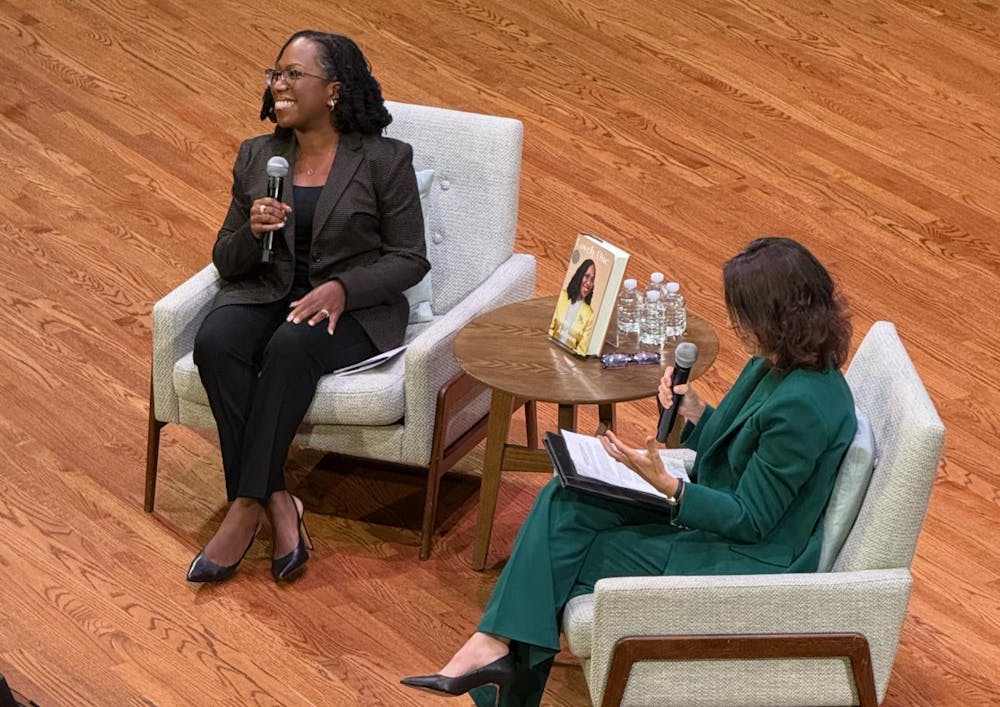Associate Justice of the Supreme Court of the United States Ketanji Brown Jackson sat down for an hour-long conversation with Professor Deborah Pearlstein in front of a full house at Richardson Auditorium on Wednesday. Nominated to the Supreme Court in 2022, she discussed her historic path to the nation’s highest court, the challenges of public life, and the lessons that have guided her career.
The talk was the first time Jackson has spoken at Princeton. Last April, Associate Justice Sonia Sotomayor ’76 spoke on campus in April to mark the naming of 36 University Place in her honor.
Supreme Court justices often take to the lecture circuit during the court’s late summer recess, but are careful about their remarks.
The justice opened the event by reciting the preface of her memoir “Lovely One” published last year.
“I, the daughter of African American parents who had come of age in the segregated south during the 1950s and early 1960s, would become the 116th justice and the first black Woman to sit on the Supreme Court in its 233-year history,” she read. “These details made the other volume on which I would swear my historic oath doubly significant.”
Jackson said that she first considered writing a memoir following her nomination to the Supreme Court by former President Joe Biden in April 2022 and her subsequent confirmation process.
“Between April and June, I really started thinking about how grateful I was to have gotten through that process,” she said. “I just thought this would be a great time to mark this moment before I get onto the board.”
Pearlstein asked Jackson how she navigated difficult decisions in her personal and professional life. Jackson described learning how to “pick and choose battles,” recalling two formative moments — one as a high school student in which she was racially profiled walking into a store with her white friends, and one as a college student at Harvard, when a peer displayed a Confederate flag in his dorm window.

The Black Students Association mobilized in protest, but the effort became consuming. Jackson remembered turning to words from author Toni Morrison for perspective: “The very serious function of racism is distraction, that it keeps you from doing your work.”
“Part of my mother’s lesson was you’re going to see the injustices. You may even face them, but you have to understand that focusing on them will end up, at times, taking you away from the work, which is really the most important thing,” she added.
Her inspiration to enter the judiciary, Jackson said, came in part from learning about Judge Constance Baker Motley, the first African American woman appointed to the federal bench. “We happened to share a birthday, so I was very interested in her life,” she said. “I thought maybe not just a lawyer — maybe I could be a judge.”
Former President Barack Obama appointed Jackson in 2013 to the U.S. District Court for the District of Columbia. Reflecting on that transition, she recalled, “to go from being an appellate practitioner to the trial court, being the judge was very stressfu[l].”

Pearlstein continued by asking Jackson about her motivation to write dissenting positions and, oftentimes, write a lone dissenting opinion on the record. Jackson replied that “dissents are an extraordinary aspect of our American legal tradition” and “they symbolize something that is core to who we are as Americans, freedom of expression.”
“It’s spectacular that there is this opportunity for the people whose positions have not prevailed today to lay down a marker to explain why they think the majority has gotten wrong, and to hopefully plant seeds for the future,” she said.
Pearlstein also alluded to the court’s relationship with the Trump administration, asking, “do you think the court’s job is, or should be different when the President is different or behaving differently?”
“I don’t know that the judiciary should be doing something different. I just think we need to be doing our jobs, which is to ensure that the law is announced, pronounced and followed,” Jackson responded.
In addition to her law insights, Jackson discussed her personal interests. She said she is an avid watcher of the reality TV show “Survivor” and occasionally knits and sews. She also corroborated Justice Ruth Bader Ginsburg’s opinion that hot dogs are not sandwiches, which sparked applause throughout the auditorium.
After the change in the discussion’s subject matter, Professor Pearlstein returned to where the conversation started — Jackson’s autobiography, “Lovely One.” For the first time since the book’s publication last year, Jackson was asked what she hopes her readers will take away.
Jackson hopes to be “inspiring other young people who grew up going to public high school somewhere, who were first or second generations in their family, to do the things that they’re passionate about and hopefully succeed.”
“I just want people to be inspired by [my] life story and to continue to do the work to help others come to this point” she closed.
Justus Wilhoit is a head Audience editor and senior News writer for the ‘Prince.’ He is from Kenosha, Wis. and typically covers Princeton’s eating clubs and co-ops, identity and student life, and the Trump administration.
Isaac Bernstein is a staff News writer for the ‘Prince.’ From Pittsburgh, Penn., he often covers academic departments, faculty research, and alumni news.
Please send any corrections to corrections[at]dailyprincetonian.com.








